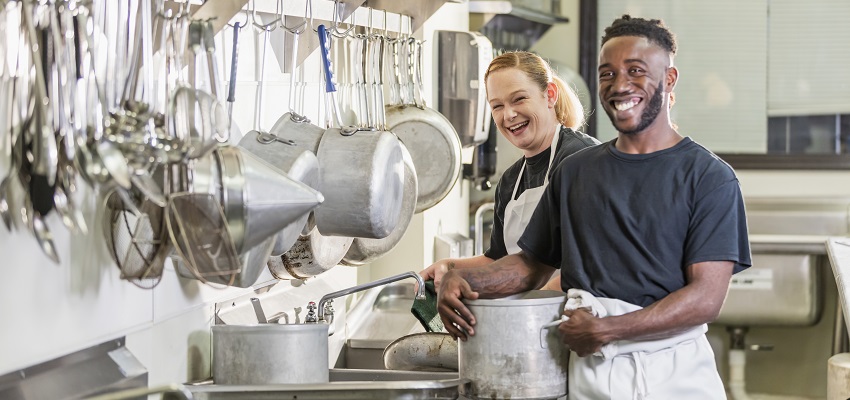Articles
September 26, 2023
National Food Safety Month in review
Take time to review everything covered this last month to reflect on what building a strong food safety culture means.

Food safety training goes beyond theoretical understanding. It's about cultivating a companywide culture.
Training your teams on the critically important controls that help them prepare foods safely is not a one-and-done, or even a one-month-and-done exercise but an ongoing discussion. Use the myriad ebooks, blogs, posters, exercises and other great training tools the ServSafe team developed to promote the guidance of National Food Safety Month 2023.
Being aware of the most common “time and temperature control for safety” foods, or TCS foods, and the temperature danger zone (sitting between 41°F and 135°F, and especially between 70°F and 125°F for more than two hours) is critical for serving safe food.
Be sure to bookmark foodsafetyfocus.com and ServSafe for even more food safety tips, updates, and resources. And check out the latest food safety legislation review here.
This last week of September is your last chance to save 20% on select ServSafe certifications and trainings, including ServSafe Manager, ServSafe Food Handler, and ServSafe Allergens certification courses.
The effects of time and temperature on food
From the time you check in a new food delivery until the moment a dish is served, your staff should be trained to carefully control the temperatures of food (in cold storage, ambient holding, while thawing and when cooking) and monitor the amount of time food spends outside safe temperatures.Being aware of the most common “time and temperature control for safety” foods, or TCS foods, and the temperature danger zone (sitting between 41°F and 135°F, and especially between 70°F and 125°F for more than two hours) is critical for serving safe food.
How personal hygiene affects food safety
The leading cause of foodborne illness outbreaks in restaurants is poor personal hygiene practices among food handlers, especially poor handwashing. Maintaining good personal hygiene and knowing when, where, how, and why to wash hands makes the difference between serving up safe meals and spreading potentially life-threatening diseases.Breaking down health inspections and health code violations
Many restaurant managers dread health inspections because they have misconceptions about the process. Each region in the U.S. has its own health inspection process and health code violation rules, both of which are derived from the FDA Food Code. Learn the basics and why the health department’s goal is to educate, not “catch” violations.Understanding your food safety regulations
Most food safety regulations are local, and it’s smart for operators to build relationships with their local health department reps to find out what the local regs are, why they matter, and how they affect restaurant operations.Building a culture of food safety
Through new regulations, scientific breakthroughs, advances in technology, and shifting consumer preferences, one aspect of successful restaurant operations remains the same: the continual need for food safety training. But today, food safety training goes beyond theoretical understanding; it is about cultivating a companywide food safety culture.Be sure to bookmark foodsafetyfocus.com and ServSafe for even more food safety tips, updates, and resources. And check out the latest food safety legislation review here.
This last week of September is your last chance to save 20% on select ServSafe certifications and trainings, including ServSafe Manager, ServSafe Food Handler, and ServSafe Allergens certification courses.
Supported by
-
Ecolab
![Ecolab logo]() EcolabA trusted partner for millions of customers, Ecolab (NYSE:ECL) is a global sustainability leader offering water, hygiene and infection prevention solutions and services that protect people and the resources vital to life. Building on a century of innovation, Ecolab has annual sales of $14B, employs more than 47K associates and operates in more than 170 countries. The company delivers comprehensive science-based solutions, data-driven insights and world-class service to advance food safety, maintain clean and safe environments, and optimize water and energy use. Ecolab’s innovative solutions improve operational efficiencies and sustainability for customers in the food, healthcare, life sciences, hospitality and industrial markets. www.ecolab.com
EcolabA trusted partner for millions of customers, Ecolab (NYSE:ECL) is a global sustainability leader offering water, hygiene and infection prevention solutions and services that protect people and the resources vital to life. Building on a century of innovation, Ecolab has annual sales of $14B, employs more than 47K associates and operates in more than 170 countries. The company delivers comprehensive science-based solutions, data-driven insights and world-class service to advance food safety, maintain clean and safe environments, and optimize water and energy use. Ecolab’s innovative solutions improve operational efficiencies and sustainability for customers in the food, healthcare, life sciences, hospitality and industrial markets. www.ecolab.com
Follow us on LinkedIn @Ecolab, Twitter @Ecolab, Instagram @Ecolab_Inc and Facebook @Ecolab.
Supported by
-
Tork
![]() TorkThe Tork brand offers professional hygiene products and services to customers worldwide ranging from restaurants and healthcare facilities to offices, schools, and industries. Our products include dispensers, paper towels, toilet tissues, soap, napkins, and wipers, but also software solutions for data-driven cleaning. Through expertise in hygiene, functional design, and sustainability, Tork has become a market leader that supports customers to think ahead so they're always ready for business. Tork is a global brand of Essity and a committed partner to customers in over 110 countries. To keep up with the latest Tork news and innovations, please visit www.torkusa.com
TorkThe Tork brand offers professional hygiene products and services to customers worldwide ranging from restaurants and healthcare facilities to offices, schools, and industries. Our products include dispensers, paper towels, toilet tissues, soap, napkins, and wipers, but also software solutions for data-driven cleaning. Through expertise in hygiene, functional design, and sustainability, Tork has become a market leader that supports customers to think ahead so they're always ready for business. Tork is a global brand of Essity and a committed partner to customers in over 110 countries. To keep up with the latest Tork news and innovations, please visit www.torkusa.com

